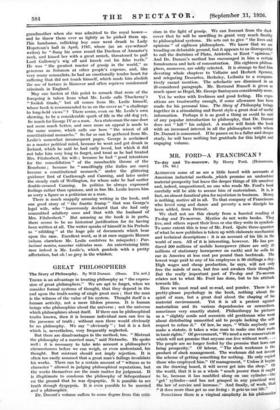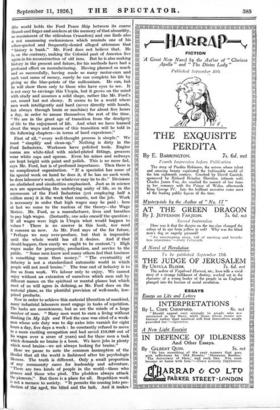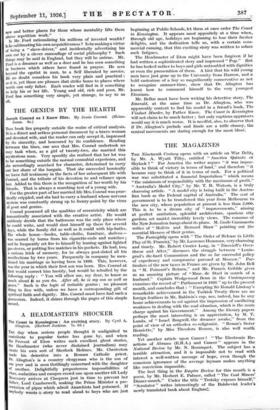MR. FORD—A FRANCISCAN t
To-day and To-morrow. By Henry Ford, (Heinemann. 12s. 6d.)
ALTHOUGH some of us are a little bored with accounts of American industrial methods, ,which promise an undoubte( material prosperity but leave the deeper things of life unsolve( and, indeed, unquestioned, no one who reads Mr. Ford's boot carefully will be able to accuse him of materialism. It is, it fact, an almost fanatical plea for mysticism in business. Money is nothing, motive all in all. To that company of Franciscan) who loved song and dance and poverty a new disciple has been added, from Detroit.
We shall not see this clearly from a hurried reading of To-day and To-morrow. Mystics do not write books. They live, and others report their lives or else they write in symbols. To some extent this is true of Mr. Ford. Quite three-quarters of what he now publishes is taken up with elaborate mechanical and technical descriptions : it is an account of his life in the world of men. All of it is interesting, however. He has pro• duced 300 millions of mobile horsepower (there are only 23 millions of stationary horsepower on earth) and he sells his car in America at less cost per pound than beefsteak. The lowest wage paid to any of his employees is 30 shillings a day. High wages and cheap production, he says, will not only free the minds of men, but free and awaken their thoughts. But the really important part of To-day and To-tnorrou relates not to what Mr. Ford has done, but to his attitude towards life.
Here we must read and re-read, and ponder. There is no pretty-please psychology in the book, nothing about the spirit of man, but a great deal about the shaping of his material environment. Yet it is all 'a protest against materialism and its various dependencies or cowardices, sometimes very smartly stated. Philanthropy he pictures as a " slightly senile and eccentric old gentleman who went about distributing unmerited aid to people lacking the self- respect to refuse it." Of law, he says, " While anybody can make a statute, it takes a wise man to make one that roots in basic rights." Of government, " We need a new conservatism which will not promise that anyone can live without work. . • • The people are no longer fooled by the promise that laws can bring prosperity." Of labour, " The slack workman is the product of slack management. The workman did not invent the scheme of getting something for nothing. He only copied those who employed him." Of management, " Unless it begins on the drawing board, it will never get into the shop." 01 the world, that it is as a whole " much poorer than it ought to be, because it has muddled along on one cylinder—the get ' cylinder—and has not grasped in any practical way the law of service and increase." And finally, of work, that it does more than get us our living : it gets-us our life." Sometimes there is a virginal simplicity in his philosophy' (the world holds the Ford Peace Ship between its coarse thumb and finger and snickers at the memory of that absurdity, so reminiscent of the ridiculous Crusaders) and one finds also a not unamusing cocksureness which reminds one of his often-quoted and frequently-denied alleged utterance that " history is bunk." Mr. Ford does not believe that. He is, on the contrary, making the Colonial past of America live again in his reconstruction of old inns. But he is also making history in the present and future, for his methods have had a profound effect on manufacturing. Having planned so much and so successfully, having made so many motor-cars and such vast sums of money, surely he can complete his life by giving us the blue-prints of the millennium. He can, but he will show them only to those who have eyes to see. It is not easy to envisage this Utopia, but it grows on the mind• with study and assumes a solid shape, rather like Mr. Ford's car, sound but not showy. It seems to be a world where men work intelligently and hard (never directly with hands, but always through brain or machine) for about five hours a day, in order to amuse themselves the rest of the time. " We are in the great age of transition from the drudgery of life to the enjoyment of life. And what we have learned about the ways and means of this transition will be told in the following chapters—in terms of hard experience."
First of all, " every well-thought process is simple." We must " simplify and clean-up." Nothing is dirty in the Ford Industries. Workmen have polished tools. Engine rooms are white-tiled with nickel-plated fittings, greasers wear white caps and aprons. Even his mines and railways are kept bright with paint and polish. This is no mere fad, says Mr. Ford, but is of profound importance. Then there is no complicated organization. " If a specialist has some of his special work on hand he does it, if he has no such work he does labourer's work, or whatever may be to do." Divisions are abolished and similarities emphasized. Just as in science men are approaching the underlying unity of life, so in the microcosm of the Ford Industries (yet employing half a million men) it is the work that counts, not the job. Work is necessary in order that high wages may be paid : here at last we come to the nucleus of the theory—the Wage Motive. Mr. Ford, as a manufacturer, lives and breathes to pay high wages. (Instantly, one asks oneself the question : If all wages were high in Utopia what would happen to values ? - There is no answer in this book, nor need it concern us now. As Mr. Ford says of the far future, " Perhaps we may over-produce, but that is impossible until the whole world has all it desires. And if that should happen, then surely we ought to be content.") High wages make for prosperity, production, and service to the public. " Some men know and many others feel that business is something more than money." " The eventuality of industry is not a standardized automatic world in which people will not need brains." - The true end of industry is to free us from work. We labour only to enjoy. We cannot enjoy without an extension of ourselves which men call by different names on the spiritual or mental planes but which most of us will agree in defining, as Mr. Ford does on the material plane, as the plentiful provision of well-made, low- priced products.
Now in order to achieve this material liberation of mankind, many industrial labourers must engage in tasks of repetition.
The tasks are monotonous, but so are the minds of a large number of men. " Many men want to earn a living without thinking (in My Life and Work the case was cited of a work- man whose sole duty was to dip axles into varnish for eight hours a day, five days a week : he constantly refused to move to a more exciting occupation and had saved £10,000 out of his wages over a score of years) and for these men a task which demands no brains is a boon. We have jobs in plenty which need brains—we are always looking for brains." Here we pause to note the common assumption of the idealist that all the world is fashioned after his psychologic likeness. The truth is different. Only a small proportion of any community cares for leadership and adVenture. There are two kinds of people in the world—those who pioneer and those who plod. The plodders always attack the pioneers." But there is a place for all. Repetition work ti not a menace to society. "It permits the coming into pro- duction of the aged, the blind and the halt. And it makes new and better places for those whose mentality lifts them above repetition work." •
Is Mr. Ford rationalizing his millions of invested wealth? Is he sublimating his own acquisitiveness ? Is he making a virtue of being a " slave-driver," and incidentally advertising his own car by a clever camouflage of social philosophy ? Such things may be said in England, but they will be untrue. Mr. Ford is a dreamer as well as a doer and he has seen something in business which others have found in prayer. He sees beyond the egotist in man, to a Self liberated by service. lie no doubt considers his book very plain and practical : so it is, yet there are phrases that strike home to places where words can only falter. Each reader will find in it something to help his or her life. Young and old, rich and poor, Mr. Ford has something very simple, yet strange, to say to us all.








































 Previous page
Previous page